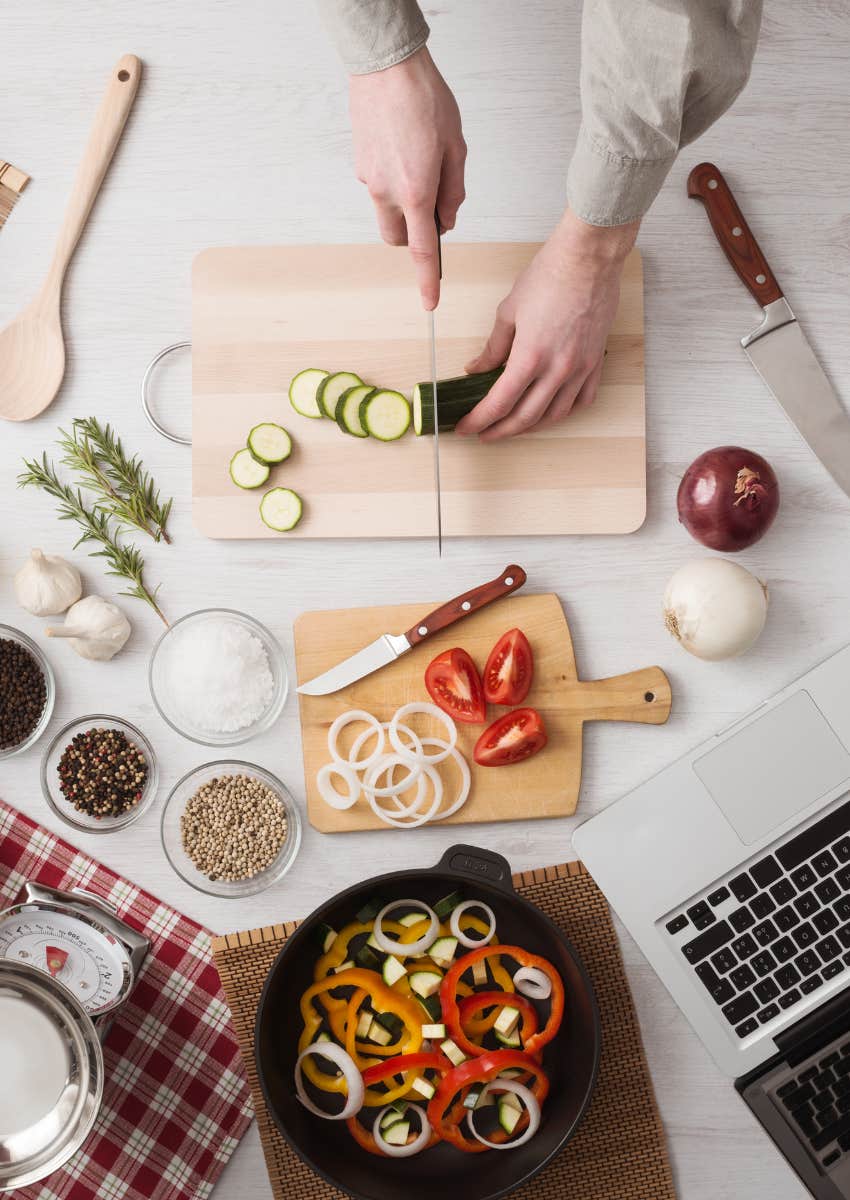3 Ways To Make Figuring Out What To Make For Dinner Every Day For The Rest Of Your Life Less Overwhelming
Meal planning can actually be easy.
 Drazen Zigic | Shutterstock
Drazen Zigic | Shutterstock Deciding what to make for dinner each night? Exhausting. Realizing you have to do it every night for the rest of your life? Makes me want to keep my favorite takeout places on speed dial. As Lydia Swann, co-founder of recipe platform Watermelon Pie, explained in a video, the mental load that goes into meal planning and food prep is all too often overlooked.
"You're not tired of cooking," Swann said in a separate video. "You're tired of thinking about it all the time."
Planning and cooking meals can quickly get overwhelming, which is why many people turn to ready-made and fast food options. However, there are ways to lighten the mental load of food prep and free up more of your time for other things. Here are a few ways to make it a little easier to figure out what to make for dinner every day for the rest of your life:
1. Create rituals
 Alejandro Landero from Studio Mexico | canva
Alejandro Landero from Studio Mexico | canva
Deciding on habits that repeat every week helps reduce fatigue from making decisions. Maybe it's Friday pizza night, or Tuesday taco night, or even picking a set dinner for each day of the week. Having a habitual meal for specific days takes away the mental work of deciding and planning.
Natacha Duke, MA, RP, registered psychotherapist, explained, "Decision fatigue is a phenomenon (as opposed to a diagnosable medical condition) where the more decisions a person makes over the course of a day, the more physically, mentally, and emotionally depleted they become." This can lead to issues with daily functioning and judgment, so taking even just one decision off the table can help reduce that sense of overwhelm tremendously.
2. Make meal prep an experience
 demaerre from Getty Images Pro | canva
demaerre from Getty Images Pro | canva
Try writing down your meal plan on a tangible object that other family members can see, be it a sticky note, a calendar, or a whiteboard on the fridge. Yeah, it sounds a little old-fashioned, but putting pen to paper in this case can seriously help with the process. It can show meals for the day, the week, and even the month (if you like to plan that far ahead).
A 2014 study actually confirmed that writing trumps digital notes in a multitude of ways, including retaining information, and, as planner company Jane's Agenda noted, "handwriting helps cement the day’s tasks in your brain." That's because you need to take the extra time to mindfully think about the task. The planner company added, writing, "helps reduce distractions, especially when compared to digital tools that are full of alerts, notifications, and other interruptions. The physical act of writing focuses your attention on the task at hand, giving you mental clarity."
All this is to say that you need to make time to actually complete the task instead of putting it off and humming and hawing over it. When you write down a meal plan, you do it with intention.
Visual schedules are also extremely beneficial for teaching children about healthy eating. By letting them see exactly what they're eating and when, it helps set expectations and makes it easier to introduce new foods. If they're interested, have them get involved in planning! Showing them how to make healthy decisions surrounding food can set them up for a lifetime of success.
3. Track food inventory
![]() ViDI Studio | Shutterstock
ViDI Studio | Shutterstock
Using an app or spreadsheet to document exactly what you have and what you need can reduce the work of figuring out your grocery list. If you know what you have, it takes the guesswork out of choosing. You'll also be less likely to get something in mind that requires a trip to the store, which can be frustrating.
Instead, you'll be able to see exactly what you have in the house and what you're out of, and use it to plan what to cook. You can even keep track of when things were bought and when they'll go bad, when to prep, how to use ingredients across meals, and more.
Get the whole family involved! Post the inventory list (why not handwrite it?!) somewhere in the house, or share it to everyone's devices. Not only does it help lighten the workload, but it also makes everyone in the house aware of what's available and what needs to be restocked. Kids will be much less likely to complain about what's for dinner if they are involved in making and have access to the grocery lists.
Kayla Asbach is a writer currently working on her bachelor's degree at the University of Central Florida. She covers relationships, psychology, self-help, pop culture, and human interest topics.

